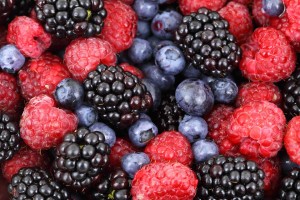These 3 Food Myths Could Be Hurting Your Health, According to a Stanford Nutrition Professor
This article originally appeared in Fortune Magazine by Christopher Gardner and was updated: on Jan 19, 2017.
This week Christopher Gardner, a nutrition professor at Stanford University and a long-time vegetarian, debunks common misconceptions about healthy eating.
Now that the holidays have come and gone, it’s time to hunker down and commit to the resolutions we’ve made. For many of us, this means striving for and more importantly sticking to, a healthier diet.
Unfortunately what that actually entails can be hard to pin down. We live in the age of fad diets: Nutrients, foods, and entire regional cuisines are dismissed as unhealthy, only to be re-embraced shortly thereafter.
If you’re confused, at least take comfort in the fact you’re far from alone. With that in mind, I’ve decided to dispel some fundamental misconceptions about how we approach healthy eating.
- Carbohydrates. The anti-carb/low-carb craze has gone too far. No matter the health philosophy you prescribe to — be it veganism/vegetarianism/pescetarianism, or a Paleo/gluten-free/low-carb/high-fat diet — you’re likely in favor of eating a wide variety of delicious and vibrantly colorful non-starchy vegetables, such as heirloom tomatoes, butternut squash, carrots, mixed salad greens, swiss chard, and sweet red bell peppers. For carb watchers, the irony here is that these are all carbohydrate-rich foods (65% to 90% of their calories come from carbohydrates). For the record, beans, whole grains, fruits and all other vegetables are carbohydrate-rich foods, too.
So instead of stripping out all carbs from your diet, which would mean eliminating healthy and delicious foods such as the veggies listed above, focus on reducing your intake of added sugars (i.e. sugars not naturally found in fruits and other plant foods) and refined grain.
The average American consumes far too much of both. While the United States Department of Agriculture (USDA) recommends that less than 10% of our daily calories should come from these sugars, the typical American exceeds that benchmark. This is true across all age groups, particularly for children two to 19 years old. On average, boys and girls in this demographic get around 16% of their daily calories from added sugars. Because the body breaks up and absorbs sugar very quickly, a sugary diet floods the bloodstream with high amounts of glucose. Over time, this can lead to a range of metabolic problems including obesity, diabetes, and heart disease.
In addition to sugar, as a nation we’re eating far too much refined flour, the main ingredient in household staples such as white sliced bread, cereals, cookies, crackers, and pastries. Unlike whole grain flour, refined flour grain is milled to remove its bran and germ, which also removes most of its nutritional value, leaving behind starchy carbohydrates. Because starch is essentially just long strings of glucose, a diet high in refined flour can lead to many of the same problems as a diet packed with added sugars.
Bottom line: Instead of vilifying carbohydrates focus on eating whole, unprocessed meals and avoiding processed foods that often contain refined wheat and added sugars.
- Protein. Judging from the explosion of protein products — a category that includes bars, smoothies, and even protein water — you’d think our national diet is deficient in this basic food component.
Which, frankly, boggles my mind. As a country, we consume more protein per person than any other nation.
While some demographic groups do fall short of protein recommendations, including teenage girls and the elderly) others greatly exceed it. Teenage boys and adult men, for example, average 100 grams of protein a day, nearly double the recommended 56 grams.
In reality, it’s not hard to find naturally protein-rich foods. This goes for vegetarians and vegans as well. (Side note: Stop asking these folks where they get their protein. They are fine, really!) While lean meats such as chicken and salmon are good sources of the stuff, protein is also found in plant foods. And despite the widespread misunderstanding around the topic, it’s possible to get all 20 amino acids (including the nine essential amino acids not synthesized by our bodies and thus supplied only by our diets) from a combination of legumes, whole grains, nuts, vegetables, and fruits
Bottom line: Our obsession with artificial protein products is a distraction. In lieu of seeking out the protein powder, bars, etc., focus on eating a balanced diet (think lots of vegetables, legumes/beans, nuts, seafood, whole grains and fruits, and less processed snacks and foods high in saturated fat, salt and sugar).
- Fiber. What with all the attention being paid to carbohydrates and protein, it’s easy to forget about fiber. We shouldn’t, though. Fiber, which is a form of carbohydrate that we can’t digest and thus can’t be absorbed in our upper small intestine, travels on to our lower intestine and feeds the microbial community living in our colons. This may sound gross, but it’s important: A slew of recent research has connected the health of our gut bacterial populations, known as the microbiome, to our overall health, impacting everything from digestion to weight, to mental health.
In the absence of enough fiber, the microbiota chew on, and subsequently thin, the colon’s protective mucus lining, which wreaks havoc with our immune function and promotes an inflammatory state that can contribute to a variety of chronic conditions, including cardiovascular disease, diabetes, and cancer.
If you’ve noticed a theme in this column, the trend doesn’t stop here. The solution to getting enough fiber is simple: eat more whole foods, especially nutrient-dense vegetables and other plant foods that are rich in fiber.
The final word: Don’t buy into the industry-driven hype. Stop fearing carbohydrates, and stop obsessing over protein products. Healthy eating isn’t about adding supplements or avoiding entire nutrient categories. Instead, it’s about consuming plenty of carbohydrate-rich (which usually means fiber-rich) plant foods, and balancing those with smaller amounts of grains, dairy, meat, and the occasional treat. Love your food, and let it love you back.



